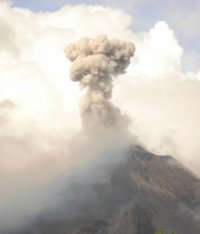Dimming the sun to minimise the effects of global warming, as
some have proposed, may bring on drought, scientists say.
They are
commenting on proposals to emulating the sun-dimming effects of large volcanic
eruptions to slow the earth's greenhouse effect.
Their study of the
1991 Mount Pinatubo eruption in the Philippines shows that the far-flung
effects of its sun-blocking particles led to a marked decrease in
precipitation worldwide.
An attempt to mimic volcanoes to cool the
earth by blocking solar energy reaching the planet's surface could have
similar short-term effects, they say, which could be worse than global
warming.
"They're all designed to cut the incoming [solar] radiation,"
says climate researcher Dr Kevin Trenberth, referring to various proposals to
geoengineer our way out of global warming.
But he says you can't
engineer the climate without thinking about the entire flow of that incoming
heat.
That heat flow warms tropical oceans, which evaporates lots of
water. The water vapour moves to higher latitudes, where it rains down and
releases heat that can radiate back into space.
"So if you are
changing this flow of energy, it's going to have an impact," says Trenberth,
who works at the US National Center for Atmospheric Research.
The immediate effect is less rain
falling worldwide, or drought.
Rivers run dry
Trenberth
and his colleague Dr Aiguo Dai found just such a pronounced drop in
precipitation, seen in terms of the world's stream and river flows, after the
1991 eruption.
There was a "singular decrease" in river discharges into
the oceans, says Trenberth, whose work is published in the journal Geophysical Research
Letters.
Unlike the more gradual effects of global warming,
experience shows that droughts can cause famine immediately, along with
political and economic instability.
"There is really a major ethical
aspect to it," says Trenberth. "If you can really [dim solar radiation], who
is in charge? Who plays God?"
After all, he says, it's one thing to
accidentally cause the climate to change, as has happened with global warming,
and another to deliberately tinker with it.
Dangers of
tinkering
Dr Robert Adler, a climate researcher from NASA's Goddard Space Flight
Center, agrees.
"Any time you are talking about geoengineering you have
to be very careful," he says.
"If you don't understand the system, and
we do not fully understand this system, you can get
perturbations."
Another problem with mimicking volcanoes is that you
have to keep doing it or face potential trouble when the effect wears off in
18 months or so and the climate rebounds, says Trenberth.

[This is the print version of story http://www.abc.net.au/science/news/stories/2007/2009531.htm]
Volcanoes to cool climate? Get real, say experts
|
|
Monday, 20 August 2007
|
 |
|
Volcanoes kick out dust, which can stop solar
radiation from reaching the earth's surface. But scientists say
mimicking this solar dimming is no answer to climate change
(Image:
iStockphoto) |
Copyright information: http://abc.net.au/common/copyrigh.htm
Privacy information: http://abc.net.au/privacy.htm